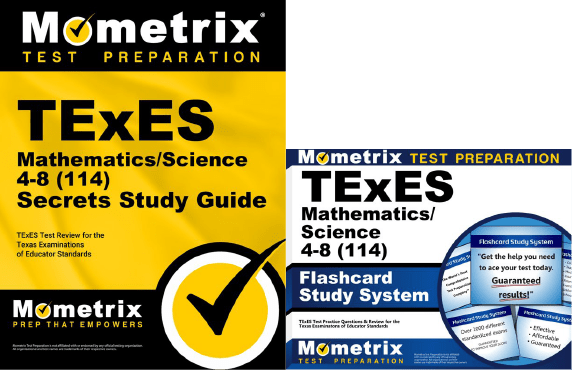If you need help studying for the TExES Mathematics/Science 4–8 exam or just want some more information about what the exam is like, you’ve come to the right place.
Click below to take a free TExES Mathematics/Science 4–8 practice test!
What’s on the Exam?
There are 120 multiple-choice questions on the exam, and the time limit is 4 hours and 45 minutes. There aren’t any scheduled breaks, but you’re free to take restroom breaks as needed.
Let’s take a closer look at the different sections of the exam.
Mathematics
50% of the exam
- Number concepts (8%)
- Patterns and algebra (11%)
- Geometry and measurement (11%)
- Probability and statistics (8%)
- Mathematical processes and perspectives (5%)
- Mathematical learning, instruction, and assessment (8%)
Science
50% of the exam
- Physical science (11%)
- Life science (11%)
- Geometry and measurement (11%)
- Earth and space science (11%)
- Science learning, instruction, and assessment (6%)
Computer-Adaptive Testing (CAT)
The TExES Mathematics/Science 4–8 exam is a computer-adaptive test. Basically, this means that the questions will become harder or easier as you go through the exam, based on how well you’re answering the questions.
For example, say you answered the first question correctly. The first question is of medium difficulty, so the next question will be slightly harder. Then, let’s say you answered the second question incorrectly. The next question would then be a medium question.
How to Register
To get started with your registration, you’ll need to create an account on the NES website. You can then register for the exam and schedule a test date through your account.
When you submit your registration, you’ll need to pay the $116 testing fee.
Exam Scores
The test is scored using a scaled scoring method. Here’s how it works:
The reason your raw score is converted to a scaled score is because everyone who takes the test is given a slightly different set of questions. Since everyone has a different arrangement of questions, and because some questions are harder than others, converting your raw score to a scaled score ensures a more even playing field.
FAQs
How many questions are on the TExES Mathematics/Science 4-8 exam?
The exam contains 120 questions.
What is the time limit for the TExES Mathematics/Science 4-8 exam?
The exam is timed at 4 hours and 45 minutes.
What is the passing score for the TExES Mathematics/Science 4-8 exam?
You’ll need to get a final scaled score of at least 240 to pass.
How much does the TExES Mathematics/Science 4-8 exam cost?
The testing fee is $116.
Mometrix Test Preparation is not affiliated with or endorsed by any official testing organization. All organizational and test names are trademarks of their respective owners.



 TExES Study Guide
TExES Study Guide TExES Flashcards
TExES Flashcards
